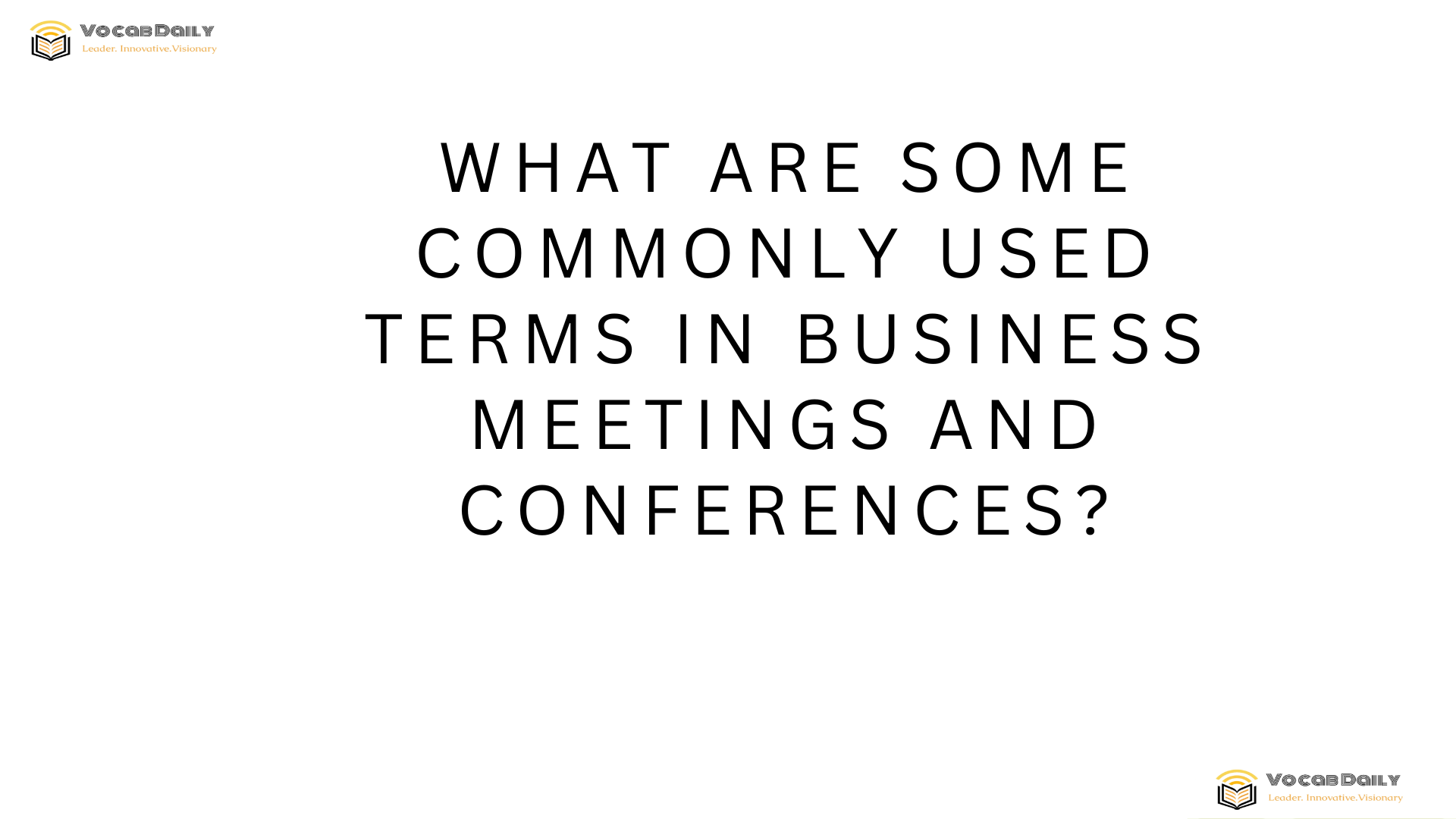Agenda
In any business meeting or conference, the term “agenda” is frequently used to describe the list of items or topics that will be discussed during the event. An agenda helps keep the meeting organized and ensures that participants understand the purpose and flow of the discussion. Effective agendas often outline specific time allocations for each topic, which helps maintain focus and efficiency.
Action Items
“Action Items” refer to specific tasks or responsibilities assigned to individuals or teams during a meeting. These are the follow-up steps that need to be taken to achieve the goals discussed. Clearly defining action items helps guarantee accountability and progress. Typically, action items are recorded in meeting minutes and reviewed at subsequent meetings to track completion.
Brainstorming
Brainstorming is a collaborative technique used in meetings to generate creative ideas and solutions. Participants are encouraged to freely share thoughts without judgment, fostering an open environment for innovation. This term is often used when teams want to tackle problems or plan strategies. Successful brainstorming sessions often lead to unique perspectives and actionable ideas.
Minutes
Minutes are the official written record of what transpired during a meeting. They document key points, decisions made, action items, and sometimes individual contributions. Minutes ensure there is a clear reference, helping participants remember commitments and progress. Accurate minutes are essential for maintaining transparency and continuity across meetings.
Moderator
A moderator is the person responsible for guiding the discussion during a meeting or conference. Moderators help ensure that the agenda is followed, everyone has a chance to speak, and conflicts are managed professionally. Their role is critical in maintaining order and making certain that meetings run smoothly and productively.
Networking
Networking refers to the process of building professional relationships with other attendees during conferences or meetings. This is a vital activity for career development, opening doors to new business opportunities, partnerships, and collaboration. Networking events or sessions are often scheduled alongside formal meetings to encourage social interaction.
Presentation
Presentations are formal displays or speeches delivered during meetings or conferences. They are typically used to share information, proposals, or findings with an audience. Presentations often include visual aids like slideshows or charts to enhance understanding and engagement. Mastering presentation skills is a valuable asset in professional settings.
Consensus
Consensus is the general agreement reached by a group during a meeting, usually after discussion and negotiation. Unlike a simple majority vote, consensus strives to include all participants’ views, aiming for solutions everyone can support. Achieving consensus is important for fostering cooperation and commitment to decisions.
Facilitator
A facilitator is similar to a moderator but often has a more active role in encouraging participation and managing group dynamics. Facilitators help groups work through challenges, encourage equal contribution, and keep meetings goal-oriented. They serve as neutral parties who guide the process rather than content.
Follow-up
Follow-up refers to the actions taken after a meeting to ensure that decisions and tasks are implemented as planned. This may include sending emails, scheduling check-ins, or providing additional information. Effective follow-up maintains momentum and accountability, preventing issues from falling through the cracks.
Keynote Speaker
A keynote speaker is a prominent individual invited to deliver the main or opening speech at a conference or business meeting. Their presentation typically sets the tone for the event, inspiring or informing the audience on important themes. Keynote speakers often attract attendees and add a level of prestige to the event.
Minutes Taker
The minutes taker is the person tasked with recording the meeting minutes. This role requires attention to detail and the ability to succinctly capture essential information without disrupting the flow of the meeting. Depending on the size and formality of the meeting, minutes takers can be designated individuals or rotate among team members.
Motion
A motion is a formal proposal made during a meeting, suggesting a specific action or decision. After a motion is stated, it often requires a second from another participant before being debated or voted on. Motions are a key part of structured meetings, especially in formal or parliamentary contexts.
Quorum
The quorum is the minimum number of participants required for a meeting to legally conduct business and make decisions. This number is usually established in an organization’s bylaws or meeting guidelines. Without a quorum, decisions may be invalid or postponed until sufficient attendance is achieved.
Stakeholders
Stakeholders are individuals or groups who have an interest or investment in the outcomes of a business meeting or project. They can include employees, managers, clients, partners, or investors. Understanding stakeholders’ perspectives is essential for effective decision-making and communication.
Strategy Session
A strategy session is a type of meeting focused on planning and establishing long-term goals for an organization or project. Participants discuss key challenges, opportunities, and resources to formulate action plans. Strategy sessions are important for aligning team efforts and setting direction.
Timekeeper
The timekeeper is responsible for monitoring the time spent on each agenda item during a meeting. This role helps ensure that discussions do not overrun and that the meeting finishes on schedule. Timekeepers often provide reminders or alerts to keep participants mindful of time limits.
Workshop
A workshop is an interactive meeting or training session where participants actively engage in exercises, discussions, or problem-solving activities. Workshops are designed to develop skills, share knowledge, or brainstorm solutions in a hands-on manner. This term is common in conferences focused on professional development.
Wrap-up
Wrap-up refers to the concluding part of a meeting or conference where key points are summarized, action items are reiterated, and any last questions are addressed. Effective wrap-ups help reinforce commitments and clarify next steps before participants leave.
Also check out VocabDaily workbook collections.

Leave a Reply